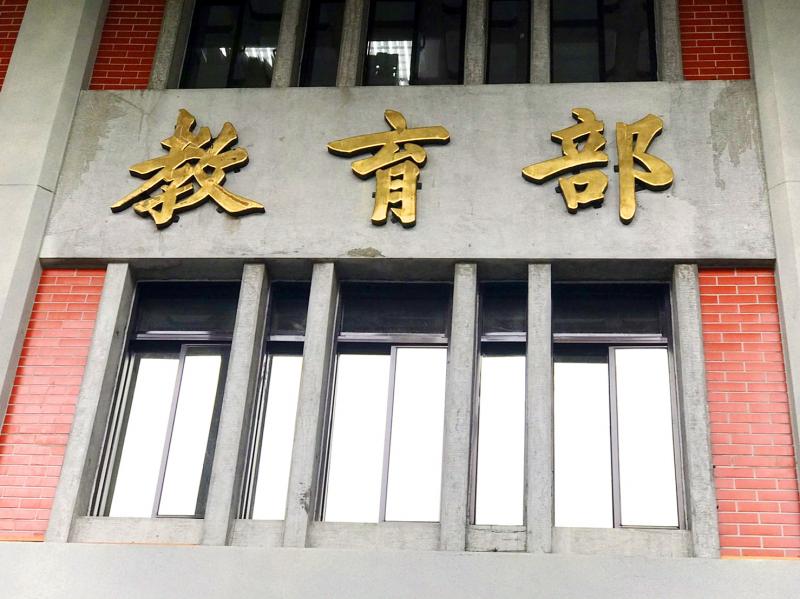The Ministry of Education has added a footnote in the abridged version of its Mandarin dictionary indicating that the terms for maternal grandparents carry the same meaning as those for paternal grandparents.
A paternal grandfather is called zufu (祖父) and a paternal grandmother is called zumu (祖母) in Mandarin, or a-gong (阿公) and a-ma (阿嬤) respectively in Hoklo (commonly known as Taiwanese).
Maternal grandparents are commonly referred to as wai zufu (外祖父) and wai zumu (外祖母) in Mandarin.

Photo: Rachel Lin, Taipei Times
The abridged version of the Ministry of Education Mandarin Chinese Dictionary is mainly used for elementary-school education, allowing students to learn the phrases’ meaning and contemporary definition, Lin Ching-lung (林慶隆), director of the National Academy for Educational Research’s Research Center for Translation, Compilation and Language Education, said on Friday.
The center decided to include the footnote due to concerns over gender equality, Lin said, adding that wai (外) is no longer used in legal matters.
In the Chinese language, a distinction is typically made using the terms nei (內, inner) to refer to the paternal side of the family and wai (外, outer) for the maternal side.
However, families nowadays are more likely to call grandparents of both sides of the family zufu and zumu, Lin said, adding that the footnote was added to reflect contemporary usage.
However, this does not mean that the terms wai zufu and wai zumu, or wai gong (外公, maternal grandfather) and wai po (外婆, maternal grandmother) no longer exist or that they have been dropped, he said.
The changes were made after discussions with experts and the Legislative Yuan’s Gender Equality Committee, Lin said, adding that the center is to review the dictionary three months for phrases or words that might need to be clarified.
Any person who have questions about the definitions in the dictionary can bring the issue to the academy, he said.
The academy will review the request and convene a panel of experts to discuss the issue, allowing the dictionary to be as up-to-date as possible, he said.

The first two F-16V Bock 70 jets purchased from the US are expected to arrive in Taiwan around Double Ten National Day, which is on Oct. 10, a military source said yesterday. Of the 66 F-16V Block 70 jets purchased from the US, the first completed production in March, the source said, adding that since then three jets have been produced per month. Although there were reports of engine defects, the issue has been resolved, they said. After the jets arrive in Taiwan, they must first pass testing by the air force before they would officially become Taiwan’s property, they said. The air force

The Coast Guard Administration (CGA) yesterday said it had deployed patrol vessels to expel a China Coast Guard ship and a Chinese fishing boat near Pratas Island (Dongsha Island, 東沙群島) in the South China Sea. The China Coast Guard vessel was 28 nautical miles (52km) northeast of Pratas at 6:15am on Thursday, approaching the island’s restricted waters, which extend 24 nautical miles from its shoreline, the CGA’s Dongsha-Nansha Branch said in a statement. The Tainan, a 2,000-tonne cutter, was deployed by the CGA to shadow the Chinese ship, which left the area at 2:39pm on Friday, the statement said. At 6:31pm on Friday,

The Chinese People’s Liberation Army Navy’s (PLAN) third aircraft carrier, the Fujian, would pose a steep challenge to Taiwan’s ability to defend itself against a full-scale invasion, a defense expert said yesterday. Institute of National Defense and Security Research analyst Chieh Chung (揭仲) made the comment hours after the PLAN confirmed the carrier recently passed through the Taiwan Strait to conduct “scientific research tests and training missions” in the South China Sea. China has two carriers in operation — the Liaoning and the Shandong — with the Fujian undergoing sea trials. Although the PLAN needs time to train the Fujian’s air wing and

STRIKE: Some travel agencies in Taiwan said that they were aware of the situation in South Korea, and that group tours to the country were proceeding as planned A planned strike by airport personnel in South Korea has not affected group tours to the country from Taiwan, travel agencies said yesterday. They added that they were closely monitoring the situation. Personnel at 15 airports, including Seoul’s Incheon and Gimpo airports, are to go on strike. They announced at a news conference on Tuesday that the strike would begin on Friday next week and continue until the Mid-Autumn Festival next month. Some travel agencies in Taiwan, including Cola Tour, Lion Travel, SET Tour and ezTravel, said that they were aware of the situation in South Korea, and that group